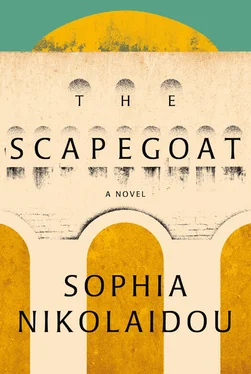Sophia Nikolaidou
The Scapegoat
My center is giving way, my right is retreating, situation excellent, I attack.
— Ferdinand Foch, French field marshal
1948: “PEACEFUL, WITHOUT SHAME AND SUFFERING”
“Every crook in Greece is in the government,” the villager told the CBS correspondent.
At first this declaration sounded extreme, but the man spoke with no emotion at all, a fact that impressed the foreigner. Barefoot, filthy, dressed in rags. Scratches on his ankles, dried blood, bruises everywhere. A man who took life as it came and made the most of it — or so he seemed to the American, who’d been raised on eggs and bacon, had studied at expensive schools, had seen plenty of poor people in photographs. Now he wrote dispatches about them, and he did so with compassion.
He hadn’t intended to interview the villager, he was on his way to meet someone else, a man of power and status, he’d been told; a man with political credentials and strict party discipline; a man of action. Something suddenly compelled him to have the driver stop the car. The villager was watching from across the way. There wasn’t a green leaf in sight, though in the outside world spring was bursting into bloom. Here it smelled of ash and scorched earth; days later the odor still filled their nostrils.
The correspondent scanned the bare mountains. The interpreter feared a trap. Tricky times, an unsuspecting American who never thought of trouble, who trusted life to treat him well. That trust had become a torment to the interpreter. Now, for instance, the man had decided they should stop here, on the edge of nowhere. My instincts are never wrong , he said — sharply, yet with the courtesy of a man who knows he’ll get his way.
Not long after, the correspondent’s photograph was published in the newspaper. After days in the water, his corpse had turned white.

The local authorities knew right away what a mess they were in. An American — a CBS correspondent, no less — had been missing for ten days. A boatman found him in the waters of the Thermaic Gulf, fifty strokes from the White Tower. The boatman had seen dead men during the war, had buried bodies with his own hands, but he’d never seen a drowned man. The corpse floated serenely. The waves a caress, the clothes untouched, no trace of blood. A film of cuttlefish eggs over the dead man’s eyes. They eat the eyes first , the boatman had heard older men say at the taverna, deep into drink.
Hands and feet loosely bound with marine rope, clothes that pegged the dead man as a foreigner. You’d never find a jacket like that in Salonica, sturdy fabric, cut and sewn with the attentiveness of a tailor who knew nothing of war, with lighthearted details, wasted fabric on the pockets. And the shirt open at the neck, What a shame, such a strong young man , the boatman thought, because the water had bleached the skin an arresting white. The sea had taken no pity. They call her mother but she’s a mean-hearted bitch. Youth means nothing to her.
The boatman threw a rope and towed the corpse to the port police. It seemed wrong to touch the head, so he left it in the waves and dragged the body by its bound feet. Then he grabbed it by the elbows and lifted, a few boys helping from shore. The body was as heavy as a sack of stones.
The coroner carefully examined the wound, a bullet hole at the back of the head. The hair around it was scorched but he could find no exit wound. The bullet had, it appeared, exited directly through the victim’s nose, It can happen , the coroner asserted with confidence, of course it can . The victim had dined on lobster and peas, he added once he had opened the body with a scalpel. Food unchewed, the man must have been in a hurry. English food, hard to come by in this city, the authorities observed, jotting notes in their little books.
— An American, the Chief of Police muttered to himself. An American reporter. Just what we need.
He poured himself some ouzo. In a tin cup, no water, on a desk piled with papers.
— We’re in it pretty deep, he said, setting the cup down on the coroner’s report.
Around that time some gypsies had stolen laundry off the Gris family’s line. Manolis Gris, eldest son and young head of the household, immediately reported the theft. He made a list of the stolen items, as his mother had advised: his white shirt, missing its third button, which his mother hadn’t had a chance to sew back on; two double sheets of white poplin with tiny blue angels on the hem; another sheet, his favorite, cotton printed with orange flowers; three nightgowns; two slips; and six pairs of panties, pardon the word.
On Saturday, August 14, 1948, the eve of the Assumption of the Virgin, Manolis Gris, thirty-eight years of age, reporter for the newspaper The Balkans and assistant correspondent at the news agency Abroad, was waiting for the bus to Kalamaria, heading home after work. He was standing on Tsimiski at the Agia Sophia stop. He’d lit a cigarette.
A plainclothes police officer came up to him and asked him to come down to the station. The officer spoke politely, looked Gris in the eye.
Manolis asked if they had news about the theft of his laundry. The officer nodded.
It was twelve years before Manolis Gris made it home. His eyes were still chestnut brown, but his hair had turned gray.
He was fifty years old.
SCHOOL YEAR 2010–2011: “SCHOOLS ENLIGHTEN ONLY WHEN THEY BURN”
MINAS
My name is Minas and I don’t want to go to university.
I DON’T WANT TO GO TO UNIVERSITY .
I stuck it on the door of my room. So they’d see it and finally stop asking.
I don’t want a diploma in a frame.
I don’t want memories from lecture halls.
I don’t want former classmates.
And I don’t have to prove anything to anyone.
All the kids at my school have lost it. They pretend not to care, but they’ve seriously lost it. Too much school rotted their brains. There’s just no way you can memorize all the nationalist uprisings in southeastern Europe in chronological order and the casualty count for each one and still have the brain of a normal person, Jesus.
They stuff their heads with useless information. They memorize the kinds of phrases that impress exam graders: in summation, moreover, nevertheless . The handouts and photocopies from their cram school classes have sample essays that all end in exactly the same way: in the critical era in which we live —pure, unadulterated bullshit. They drive themselves crazy just to score a fraction of a point higher. In class the other day, Soukiouroglou, who teaches history and language arts, asked us what the phrase “they impaled Athanasios Diakos” from our textbook meant. Not one of them had anything to say. Of course not, details like that won’t be on the exams. Soukiouroglou let a minute of total silence to go by. Then he told us about the practice of impalement. He used Dracula as an example, mentioned Bram Stoker, then played the opening scene from Coppola’s movie on the projector. All the girls in the class thought it was gross. The only one who didn’t close her eyes was Evelina Dinopoulou, little miss perfect, who’s in charge of the attendance book. Soukiouroglou lingered on some truly disgusting details. He’s amazing when it comes to things like that. Useless knowledge, sure, but if you ask me when I’m eighty, I bet I’ll still remember that class.
Soukiouroglou isn’t like the rest. He’s in a category all by himself. The first-years hear about him even before school officially starts, at the benediction ceremony. Until they take his class they’re terrified of him. But once they’ve had him as a teacher they love him. At school Souk doesn’t hang around with the other teachers. He never chaperones field trips, doesn’t show up for graduation or Carnival parties. He’s always free during break. He keeps a running tally of how many times he’s caught each student unprepared. Scary, but it works. They say he was taught by the devil himself — and one thing he learned was how to petrify any parent, colleague, or student in seconds flat.
Читать дальше













